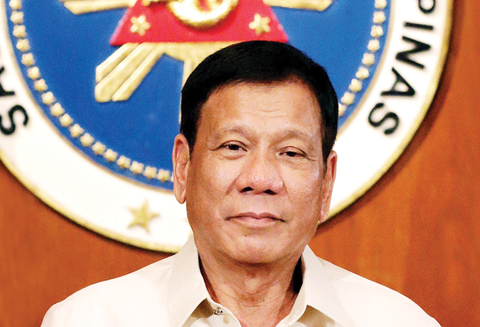HRW urges Kuwait to agree new worker safeguards
 Philippines President Rodrigo Duterte
Philippines President Rodrigo Duterte
MANILA: Philippine President Rodrigo Duterte said yesterday he would extend his ban on sending workers to Kuwait to include other countries if investigations showed Filipinos were being seriously abused by employers elsewhere. The Southeast Asian country has suspended the deployment of workers to the Gulf state since last month after Duterte said the abuse was unchecked and had driven several Filipino domestic helpers there to suicide.
"We are doing an audit now (to) find out the places where we deploy Filipinos and our countrymen suffer brutal treatment and human degradation," Duterte said in the central province of Iloilo. He was visiting the wake of a Filipino whose body was found this month in a freezer at an abandoned apartment in Kuwait, with signs of torture.
The killing was the final straw for Duterte, who asked commercial airlines to help the voluntary repatriation of workers from Kuwait. The Philippine Senate began an inquiry on Wednesday into deaths and abuse of Filipino workers. More than 2 million Filipinos are working in Kuwait and other Middle East countries, including Qatar, Bahrain, United Arab Emirates and Saudi Arabia, but many cases of abuse have also been reported elsewhere. They often work as domestic helpers, construction workers, engineers and nurses.
Kuwait has sought to mend diplomatic ties by inviting Duterte to visit, its state news agency KUNA said on Monday. The Philippine labor ministry wants Kuwait to be able to assure safety of Filipinos before the ban can be lifted. Duterte said a list of both reported and unreported cases of mistreatment of Filipino migrant workers would be prepared, which he described as "a long, long task", without mentioning any timetable. He said he would not speculate on the countries to which the worker ban could be extended.
Filipinos abroad sent home last year a record high $28.1 billion in cash remittances, money that helped fuel spending and sustain robust expansion in one of the world's fast-growing economies. Duterte has said his long-term aim is to slow the exodus abroad by boosting the domestic economy and creating jobs that provide workers with sufficient income.
Meanwhile, Human Rights Watch called on Kuwait to agree to greater protection for migrant workers as a Philippine delegation was due in the state yesterday to discuss an outcry over alleged abuses of Filipinos. But the New York-based watchdog also criticized the ban imposed by the Philippines last week on migrants leaving to work in Kuwait, saying it was likely to increase the number resorting to unregulated channels that exposed them to a greater risk of abuse.
"Kuwait should confront the outcry over deaths, beatings and rapes of domestic workers by taking immediate steps to reform the kafala system, which traps workers with abusive employers," HRW's Middle East women's rights researcher Rothna Begum said in a statement late Wednesday. The kafala or sponsorship system, widely prevalent in the oil-rich Gulf states, ties migrant workers' visas to their employers, prohibiting workers from leaving or changing jobs without prior consent.
"The Philippines should work with Kuwait to protect workers rather than ban them from migrating, which is more likely to cause harm than to help," Begum said. "Both Kuwait and the Philippines have an opportunity to work together to increase protections for domestic workers and fix the gaps that are leaving workers vulnerable to extreme abuse." Kuwait has said it is investigating reported deaths and abuses, and insisted there were only a small number considering that there are more than 250,000 Filipinos working in Kuwait.
The Philippine delegation due in Kuwait later on Thursday is headed by Labor Undersecretary Ciriaco Lagunzad. It is due to travel on to Saudi Arabia and Qatar, two other Gulf states with large Philippine migrant workforces. In all, there are more than two million Filipinos working in the region, whose remittances are a lifeline to the Philippine economy. Lagunzad said Duterte had ordered the delegation to ensure that the passports of Filipino workers are deposited with the Philippine embassy. Duterte also wants Filipinos to have access to cellphones so they can call for help in case of abuse, Lagunzad said. - Agencies




